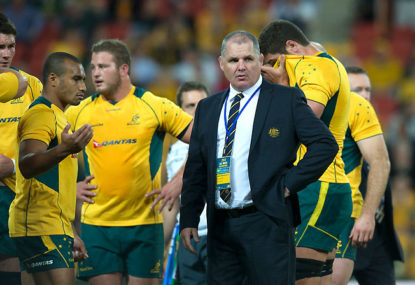The Outsider
new author
Roar Rookie

Within an hour of the final whistle having blown in the Super Rugby final, All Black No 8 Kieran Read was being asked as to the significance of the tournament’s outcome with relation to the upcoming Bledisloe Cup.
It was a legitimate question, albeit totally loaded. The Crusaders skipper’s response was surely exactly as his enquirer had anticipated, and been seeking.
“It will have no relevance,” Read said, of his team’s one-point defeat by the Waratahs.
“They are totally different teams. It’s a totally different competition.”
So the journalist had his headline.
What else was Read ever going to say?
But while the Waratahs’ maiden Super Rugby title has inevitably raised expectations for both the Bledisloe Cup and the Rugby Championship (exhibit A: the many recent Roar posts!), such comparisons to past years – and most notably 2011 – aren’t going to do the class of 2014 any favours.
Nor does the implication that Australia’s first Tri-Nations title in a decade three years ago was made more likely purely because the Queensland Reds had won Super Rugby.
Then, as now, the Crusaders line-up conquered in the final by Australian opposition was significantly different to that which faced (or which will be faced) by the Wallabies.
In 2011, just six who started the final were also in the All Black run on XV for the Tri-Nations decider less than two months later.
Nor were the Wallabies the same: just six of the Reds players started.
This year, the difference will be slightly greater – the early signs suggest that between them the Super Rugby finalists will only supply 11 of the 30 players who start next weekend’s Test: five Crusaders and six Waratahs.
Such has been the spread of talent across the Kiwi teams in recent years, now that NPC affiliations have become less irrelevant; not only has the gap between the teams closed, no one team is dominating All Black places to the extent that the Blues and Crusaders did at the height of their title-winning dynasties.
That fact was highlighted dramatically in the final where the Crusaders got little or no impetus from their bench.
In the past, the back ups were the point of difference that won them titles.
Regardless of how the individual selections play out, the point – as made by Read – is clear.
The two teams will be different.
Nor has Super Rugby, under the skewed conference system currently in play, been as reliable a form guide for the Test season as it once was.
It is not coincidental that Australia has provided two winners and a beaten finalist in three of the four years since the conference system was adopted.
With two poorly performing teams guaranteed every year due to the lack of depth across the country – the top Aussie sides do have a leg up with regards to the all important semi-final qualifying positions.
This year the Rebels were last, the Reds two places above them.
The bottom New Zealand side (the Blues) was 10th, but won two more games than the Reds, three more than the Rebels, and beat the eventual tournament champions!
Is it any wonder then, that the Waratahs were able to win 75 per cent of their matches in the weaker Aussie conference, while the Crusaders batted at just 50 per cent in the much more competitive Kiwi league?
Inevitably there will be those of you who will immediately seek to stick the boot into the South Africans, but once again the inequity of the conference system has unquestionably been a factor in what seems like their underachievement.
In a tournament as tight as Super Rugby has now become, having to play four consecutive games away from home, as opposed to two, is a massive disadvantage.
Sure, it wasn’t the reason why the Sharks stuffed up the top ranking this year – the competitiveness of the South African conference saw to that; but it did kill off the campaigns of the Cheetahs and the Stormers virtually before they had begun.
Both toured early – lost four on the trot – and were never able to recover.
In fact you only have to look at this year’s champions to see the difficulty that playing consecutively away from home presents: the Waratahs only dropped four games all season, but lost two of them in the space of a three-week tour, one in Durban, then one in Perth, where they stopped off on their way home.
Like it or not, the South Africans have got, as they always have had, a legitimate case when it comes to the travel disadvantage they have in Super Rugby.
Which is another reason why Super Rugby won’t guarantee anything once the Rugby Championship kicks off.
The All Blacks and Springboks have both increased their lead significantly as far as the margins in IRB rankings go in the last 12 months.
For all of the positive talk, the Wallabies have a lot of ground to make up!